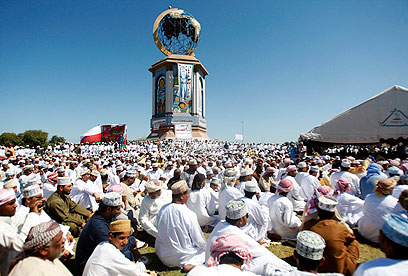
Egypt swears in new post-Mubarak Cabinet
Cabinet headed by PM Essam Sharaf expected to be approved by pro-reform groups; Oman carries out third government reshuffle in a month; Tunisia's interim president appoints new government
Egypt's military rulers on Monday swore in a new Cabinet that includes new faces in key ministries, responding to protesters' demands that the new government be free of stalwarts of ousted President Hosni Mubarak.
The new Cabinet, headed by Prime Minister Essam Sharaf, a US-educated civil engineer, is expected to be met with the approval of the pro-reform groups that led the 18-day uprising that forced Mubarak to step down on Feb. 11.
State TV showed members of the government taking an oath during Monday's swearing-in-ceremony before the head of Egypt's Armed Forces Supreme Council, Field Marshal Hussein Tantawi.
The caretaker government's main job and challenge will be to help steer the country through reforms and toward free elections.
Among the most significant changes in the Cabinet designed to meet with protesters' demands, Sharaf named a new interior minister. Maj. Gen. Mansour el-Essawy, a former Cairo security chief, replaces Mahmoud Wagdi, who held the post for less than a month. The Interior Ministry is in charge of the security forces.
El-Essawy, according to a report by the state news agency, pledged after meeting Sharaf Sunday that he would work to restore security and reduce the role of the hated State Security agency.
Protesters have over the past few days rallied outside about a dozen State Security offices across the nation, in many cases storming the buildings, including the agency's main headquarters in the Cairo suburb of Nasr City. The protests followed reports that agents were burning and shredding documents to destroy evidence that would incriminate them in possible cases of human rights abuses.
On Sunday, army soldiers fired in the air and used stun guns to disperse hundreds of protesters who attempted to storm the State Security offices inside the Interior Ministry in downtown Cairo. The protesters said they wanted to see for themselves whether the building had secret cells and to stop officers from destroying documents.
The State Security agency, which employs about 100,000 of Egypt's 500,000-strong security forces, is blamed for the worst human rights abuses against Mubarak's opponents.

Protest in Oman over the weekend (Photo: AP)
Dismantling the agency has been a key demand of the protest groups that led the uprising.
Among the new faces in the Cabinet was Nabil Elaraby, who replaces Foreign Minister Ahmed Aboul-Gheit. His predecessor had held the job since 2004 but has been maligned by the protesters because of his criticism of the uprising in its early days.
Elaraby, 76, was Egypt's UN representative in the 1990s and served as a judge at the International Court of Justice between 2001 and 2006. He was critical of the government's crackdown against the uprising and was a member of a committee to advise protest leaders on their reform demands.
The new Cabinet also includes a new justice minister, Mohammed al-Jundi, replacing one who was considered a close Mubarak ally and whose dismissal was demanded by the opposition groups.
Meanwhile, Oman carried out its third government reshuffle in a month on Monday, in the latest of a string of concessions aimed at appeasing protesters demanding jobs and political reforms in the Gulf Arab sultanate.
Sultan Qabous bin Said issued decrees naming new ministers for the interior, commerce and other ministries, and replacing the economy ministry with a committee to be set up by the cabinet, state television reported.
Also on Monday, Tunisia's interim president appointed a new government, the third caretaker administration since the overthrow of veteran leader Zine al-Abidine Ben Ali in January, a statement said.
Most key ministers from the previous government retained their job in the new cabinet led by interim Prime Minister Beji Caid Sebsi. Four ministers who resigned last week were replaced.
AP, Reuters contributed to the report
- Follow Ynetnews on Facebook










